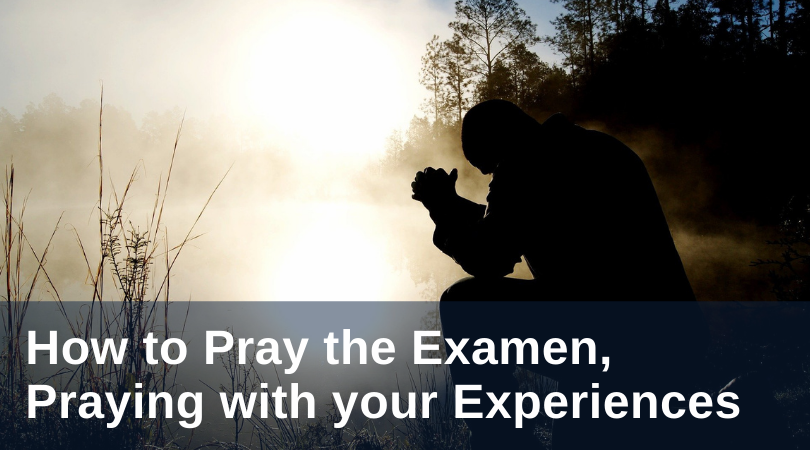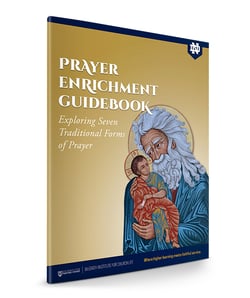
The Ignatian Examen is a prayer that helps us to identify and pay closer attention to God’s activity in everyday life. When fully adopted, the Examen becomes a habit, a daily inventory of the ways God has been at work in our lives and of the ways that we either have or have not responded to this activity of God.
The origins of the Examen
The Examen was developed by St. Ignatius of Loyola, founder of the Jesuits and a master of discerning the movements of the Holy Spirit. He believed the Examen was so powerful and important that he required every Jesuit to practice the Examen twice daily: at midday and at night.
“All the things in this world are gifts of God, created for us, to be the means by which we can come to know him better, love him more surely and serve him more faithfully." - St. Ignatius of Loyola
Why you might pray the Examen
Daily practice of the Examen improves our awareness of the slow but certain work of God in our lives. The more the Examen becomes a habit, the more aware we become of the movements of God throughout the day. If you wish to perceive the movements of the Holy Spirit with greater clarity or are in a process of discernment, the Examen would be a great practice to adopt.
How to practice the Examen
Pick a time of day
If you are going to pray the Examen once each day, the most helpful times tend to be in the morning, at midday or at night. Whatever time of day you choose, consider making it a part of your routine so that you don’t forget.
- If you tend to be a morning person or have a habit of praying at the start of the day, you can pray the Examen in the morning with the previous day as your focus.
- Midday prayer can work well for people who already have a habit of praying during their lunch hour. One distinct advantage of a midday Examen is that it gives us a chance to review the morning, see where God has already been active and still have the chance to make adjustments for the rest of the day.
- The time before going to bed can be an easy place to insert the Examen, especially if you already pray Night Prayer regularly. Nighttime is also a natural place to start practicing the Examen since you will be reviewing what happened over the course of the day.
Steps of the Examen
As you begin, invite God into your prayer and ask for the grace to see yourself honestly as you review your day. Then, at a meditative pace, review your day using the five steps below as a guide. You can prayerfully meditate on your responses or journal as you move through the reflections.
- Express gratitude
Recall your day and name anything for which you are particularly grateful. Thank God for these gifts. - Review the day
Review the events of your day. Move from morning to night and notice where you felt God’s presence. (No detail is too small or too mundane.*) Were there any invitations to grow in faith, hope or charity? How did you respond to these invitations? - Name your sorrows
Name those things from the day for which you are sorry. Include both actions and regrets, things you did or did not do. - Seek forgiveness
Ask God to forgive you. If there is someone you may have hurt and with whom you should reconcile, resolve now to reconcile with them and ask their forgiveness. - Ask for grace for tomorrow
Conclude by thanking God for the gift of your life and this day. Then, ask for the grace you need to see God’s presence more clearly and to conform yourself to Jesus Christ more closely tomorrow.
*Early on, you may feel overwhelmed by trying to remember everything that happened in your day. Don’t get discouraged! Trust that God will bring to mind those things he wishes you to see. Later, as the Examen becomes a regular practice, you will start to notice movements as they happen throughout your day, and recalling them in the evening will become easier and more natural.
Download the complete Prayer Enrichment Guidebook
 This article is the second installment of our seven-week Prayer Enrichment Series which comes directly from our free Prayer Enrichment Guidebook.
This article is the second installment of our seven-week Prayer Enrichment Series which comes directly from our free Prayer Enrichment Guidebook.
The Prayer Enrichment Guidebook introduces seven traditional styles of Catholic prayer, including lectio divina, the Examen and centering prayer.
The entry for each prayer practice introduced in this guidebook contains:
- A brief overview of the prayer practice
- Its origins
- Why one might practice it
- How one can practice it
This Prayer Enrichment Guidebook is an aid for all Christians to deepen their relationship with the Lord through new forms of prayer. It is an ideal supplement for Catholic teachers, catechists, ministers and anyone who seeks to encounter God in a new way.



